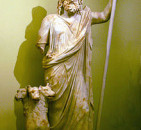Hades was the ancient Greek god of the underworld. Eventually, the god's name came to designate the abode of the dead. In Greek mythology, Hades is the oldest male child of Cronus and Rhea considering the order of birth from the mother, or the youngest, considering the regurgitation by the father. The latter view is attested in Poseidon's speech in the Iliad. According to myth, he and his brothers Zeus and Poseidon defeated the Titans and claimed rulership over the cosmos, ruling the underworld, air, and sea, respectively; the solid earth, long the province of Gaia, was available to all three concurrently.
Later the Greeks started referring to the god as Plouton (see below), which the Romans Latinized as Pluto. The Romans would associate Hades/Pluto with their own chthonic gods, Dis Pater and Orcus. The corresponding Etruscan god was Aita. He is often pictured with the three-headed dog Cerberus. In the later mythological tradition, though not in antiquity, he is associated with the Helm of Darkness and the bident. The term hades in Christian theology (and in New Testament Greek) is parallel to Hebrew sheol , and refers to the abode of the dead. The Christian concept of hell is more akin to and communicated by the Greek concept of Tartarus, a deep, gloomy part of hades used as a dungeon of torment and suffering.
- Μέρος του λόγου: proper noun
- Κλάδος/Τομέας: Ιστορία
- Category: Ancient Greece
Δημιουργός
- KSGRAM
- 100% positive feedback
(Athens, Greece)





